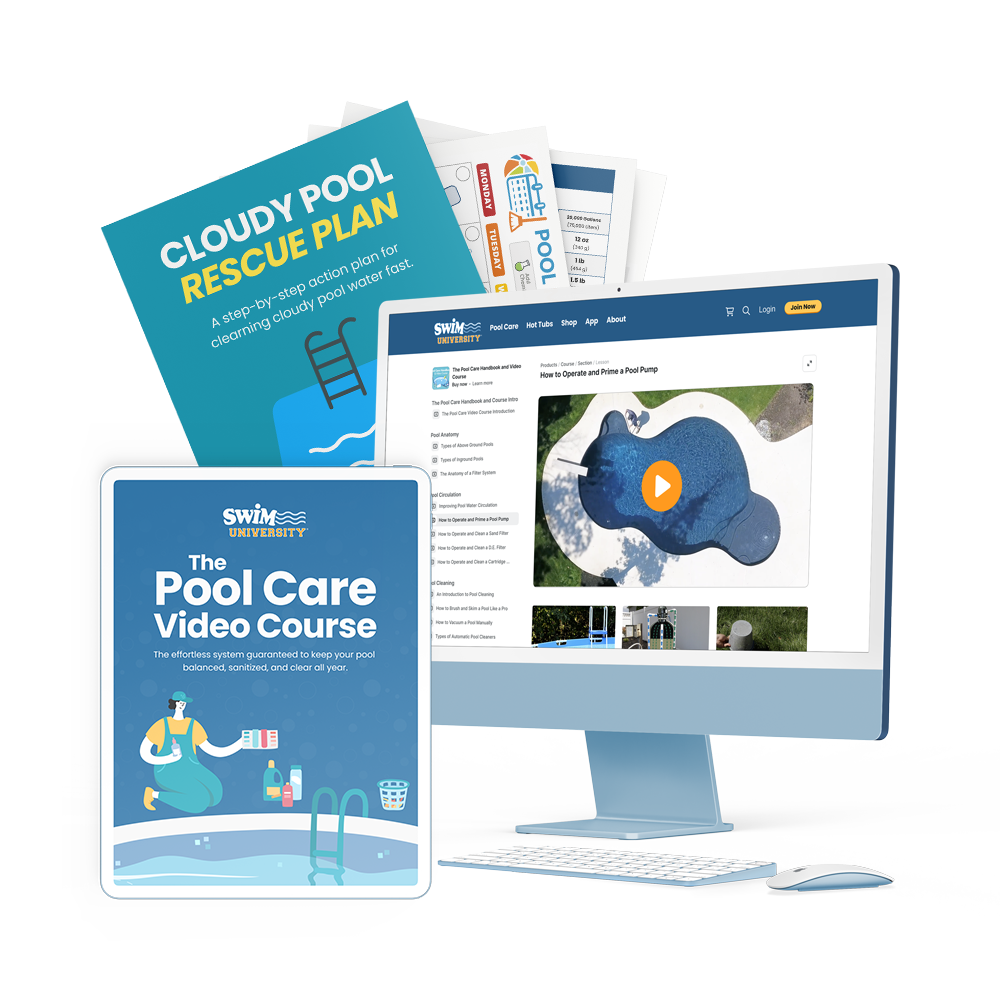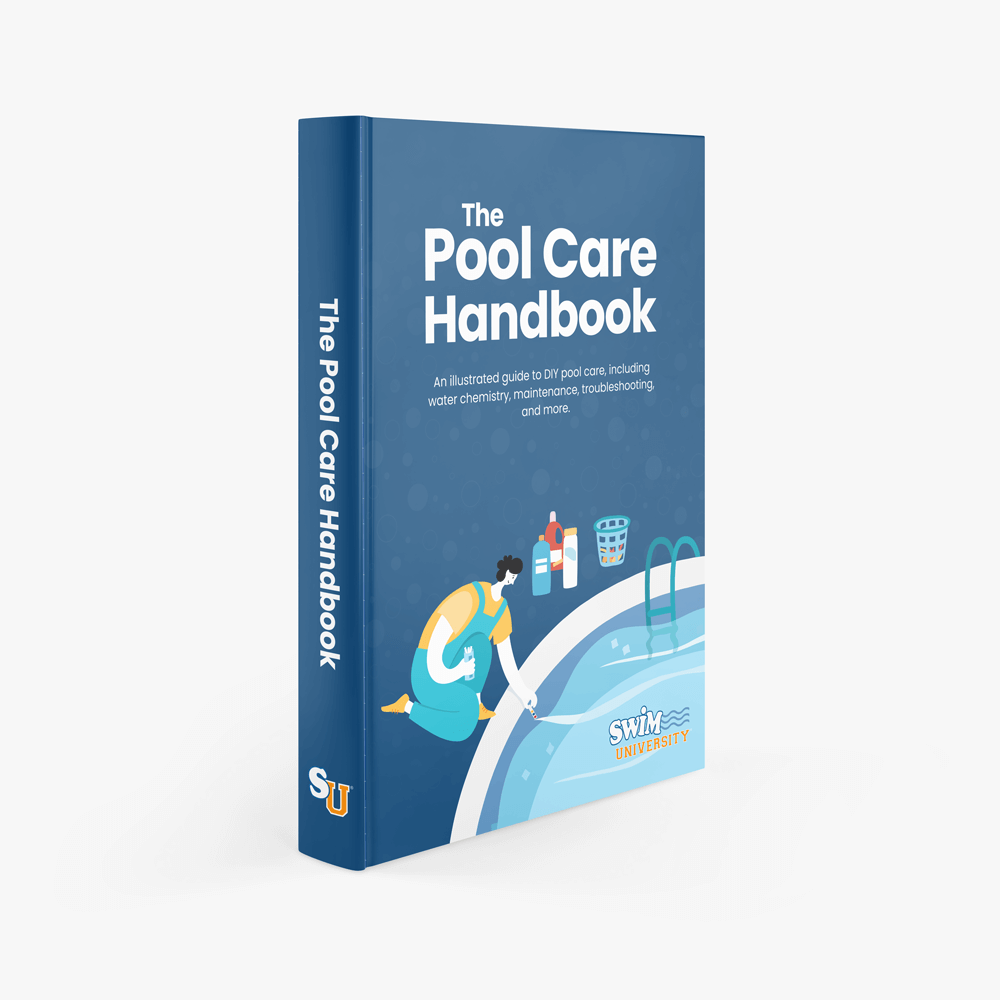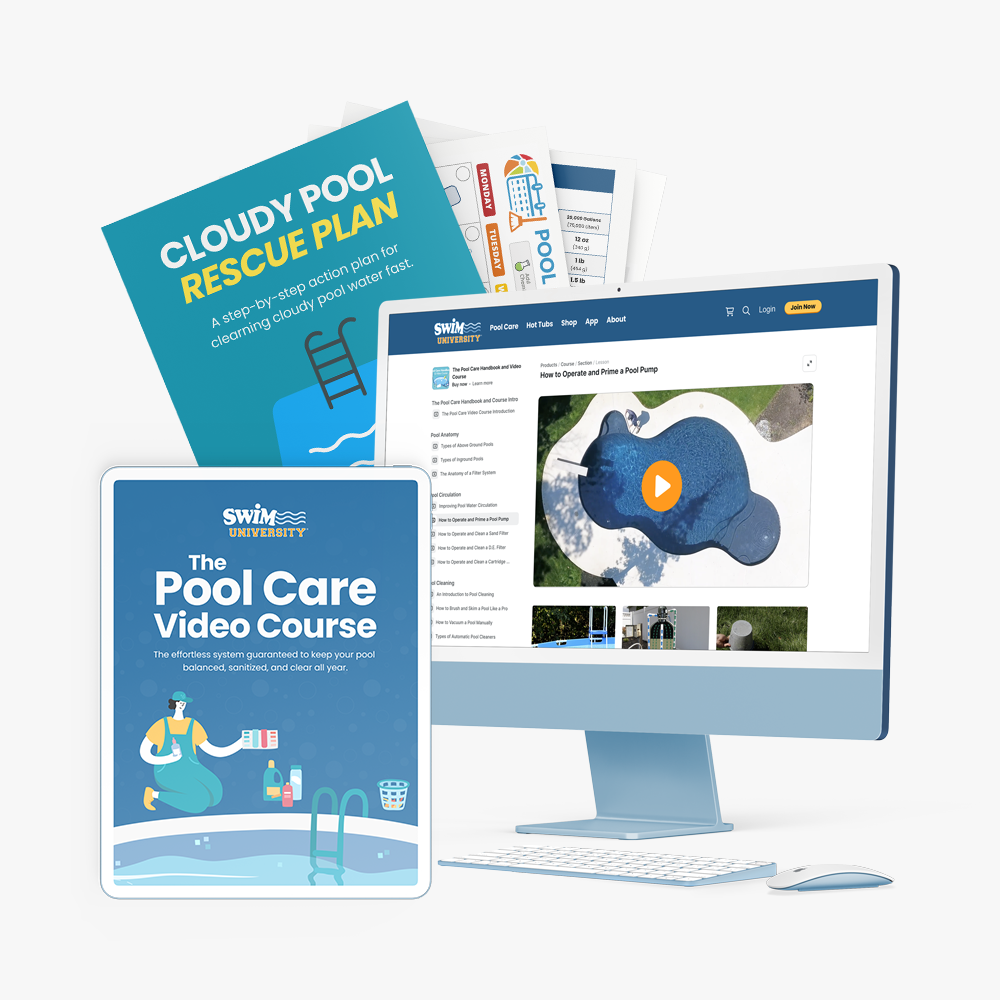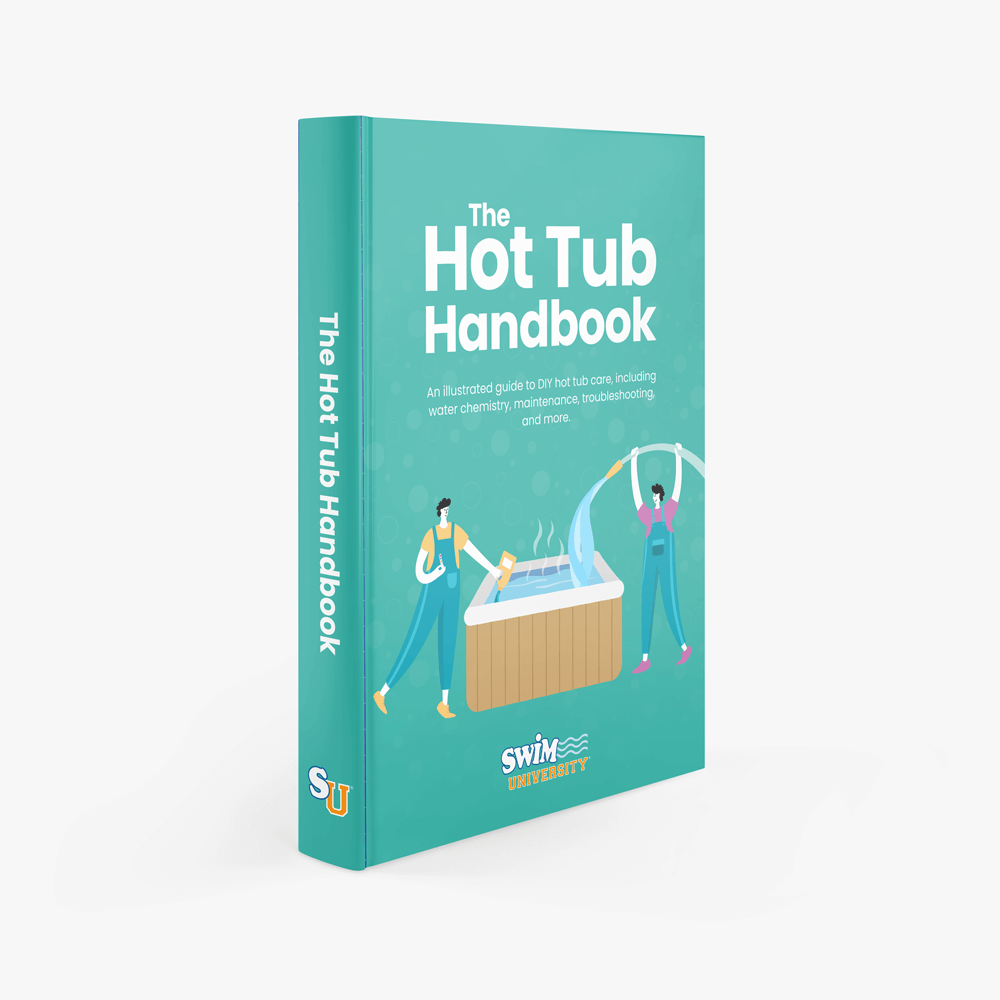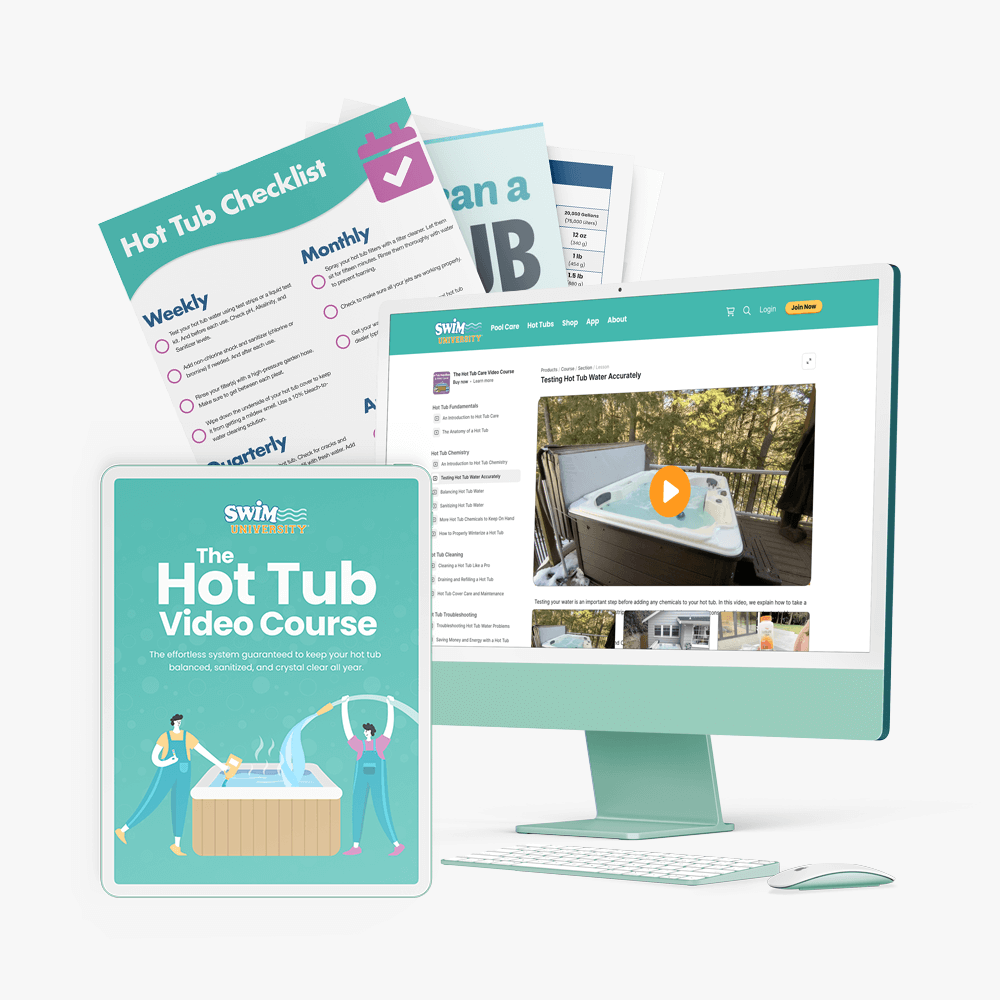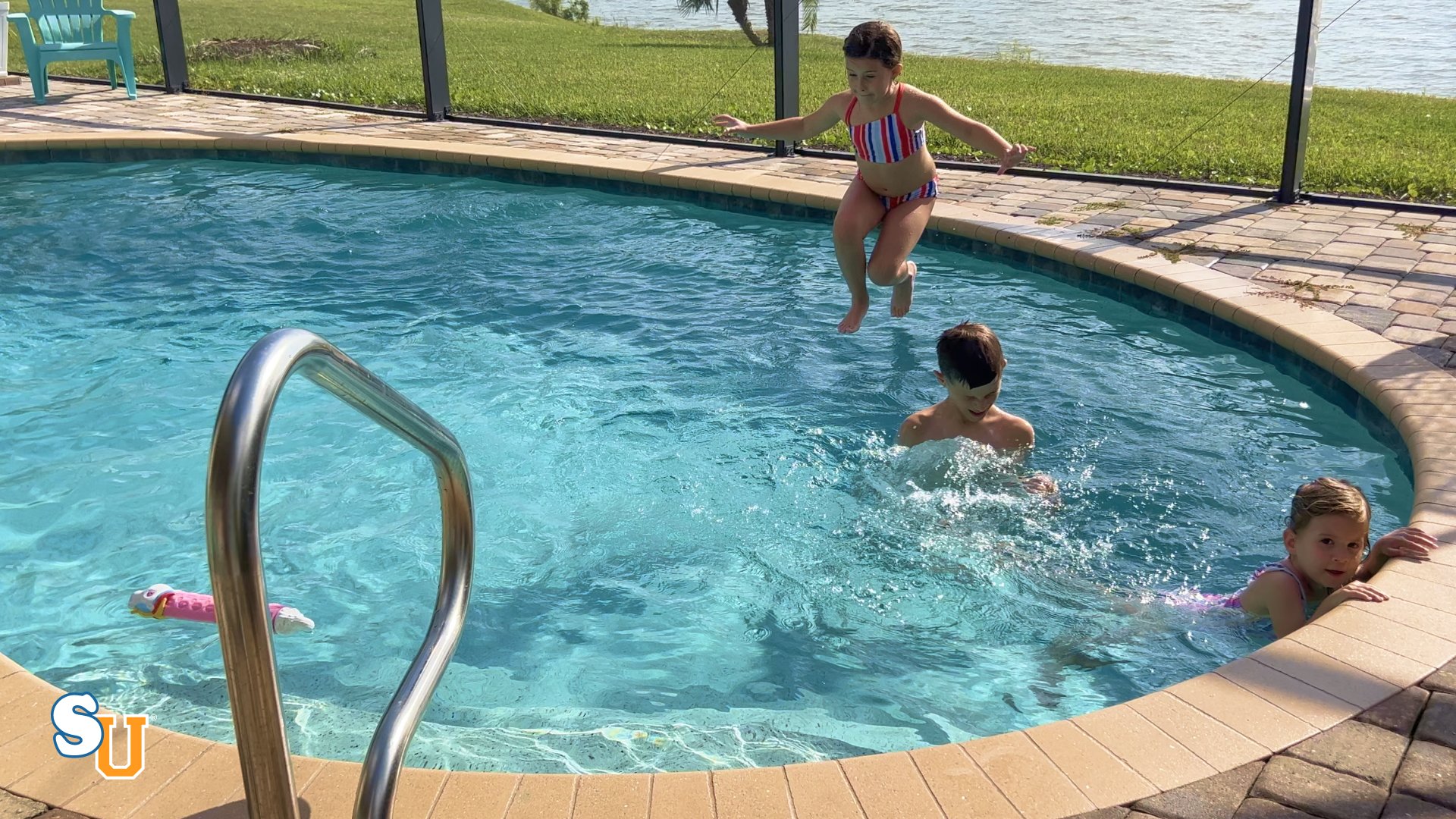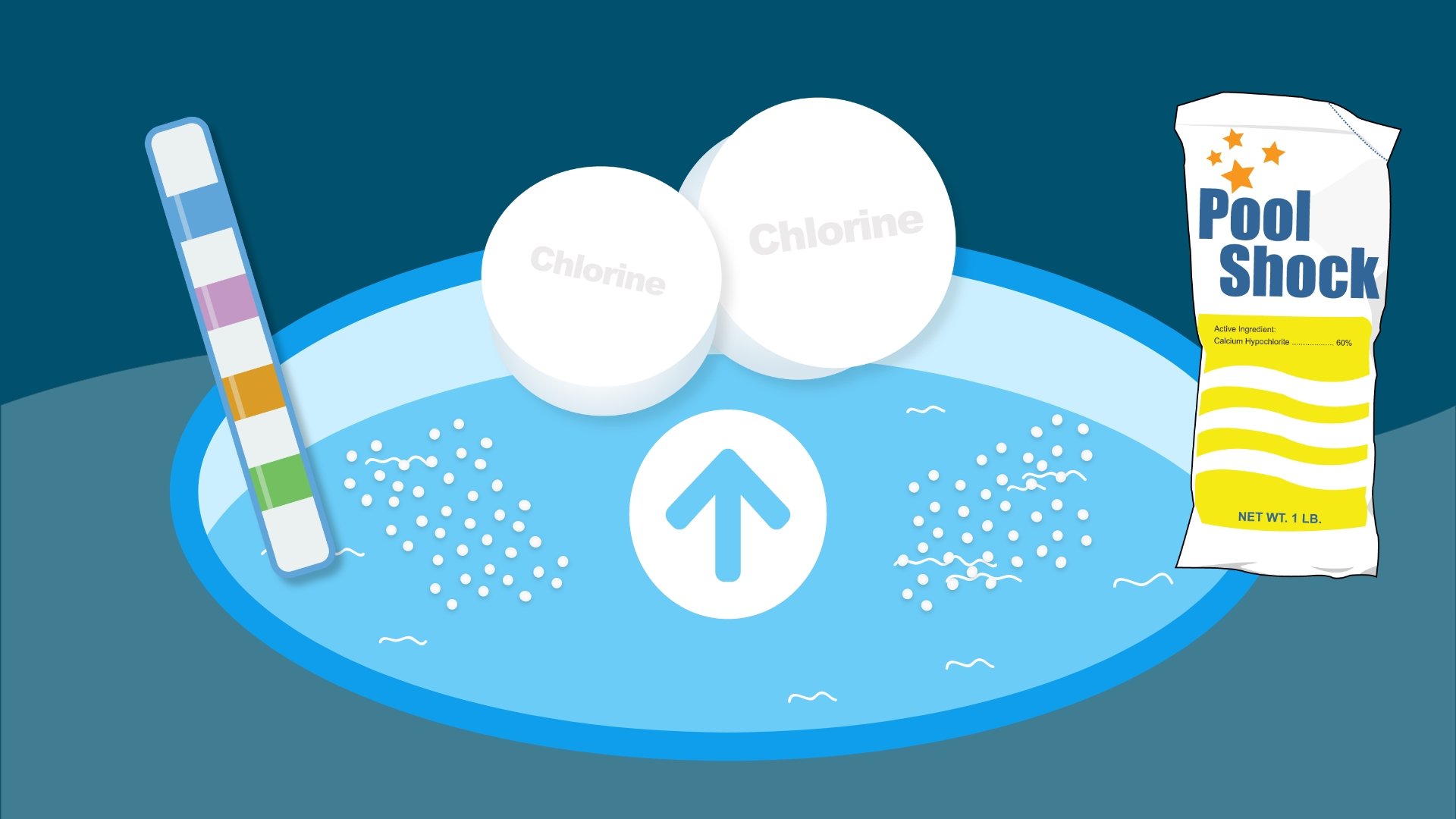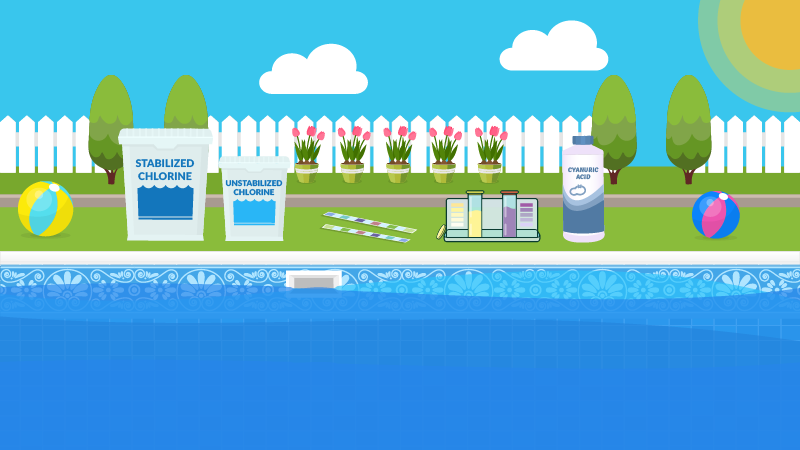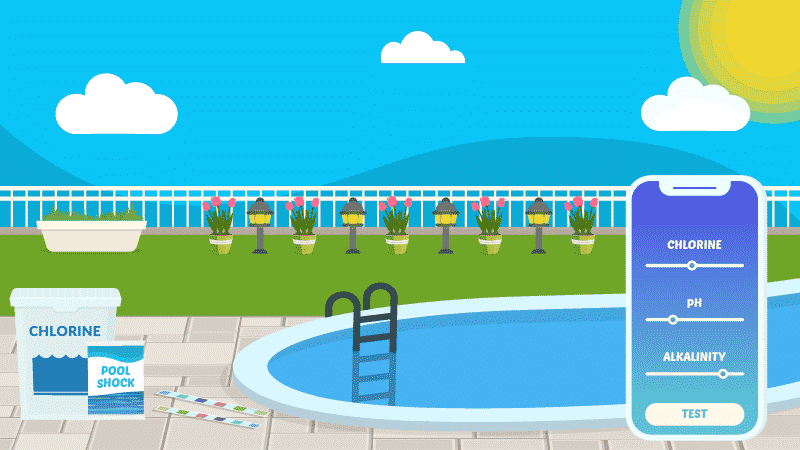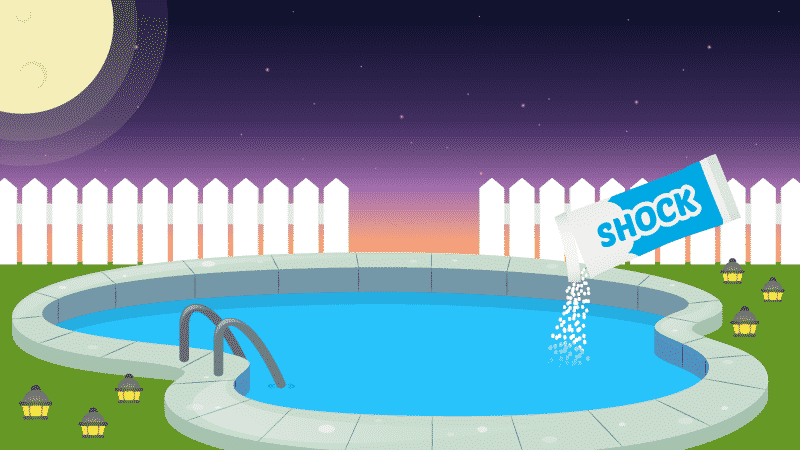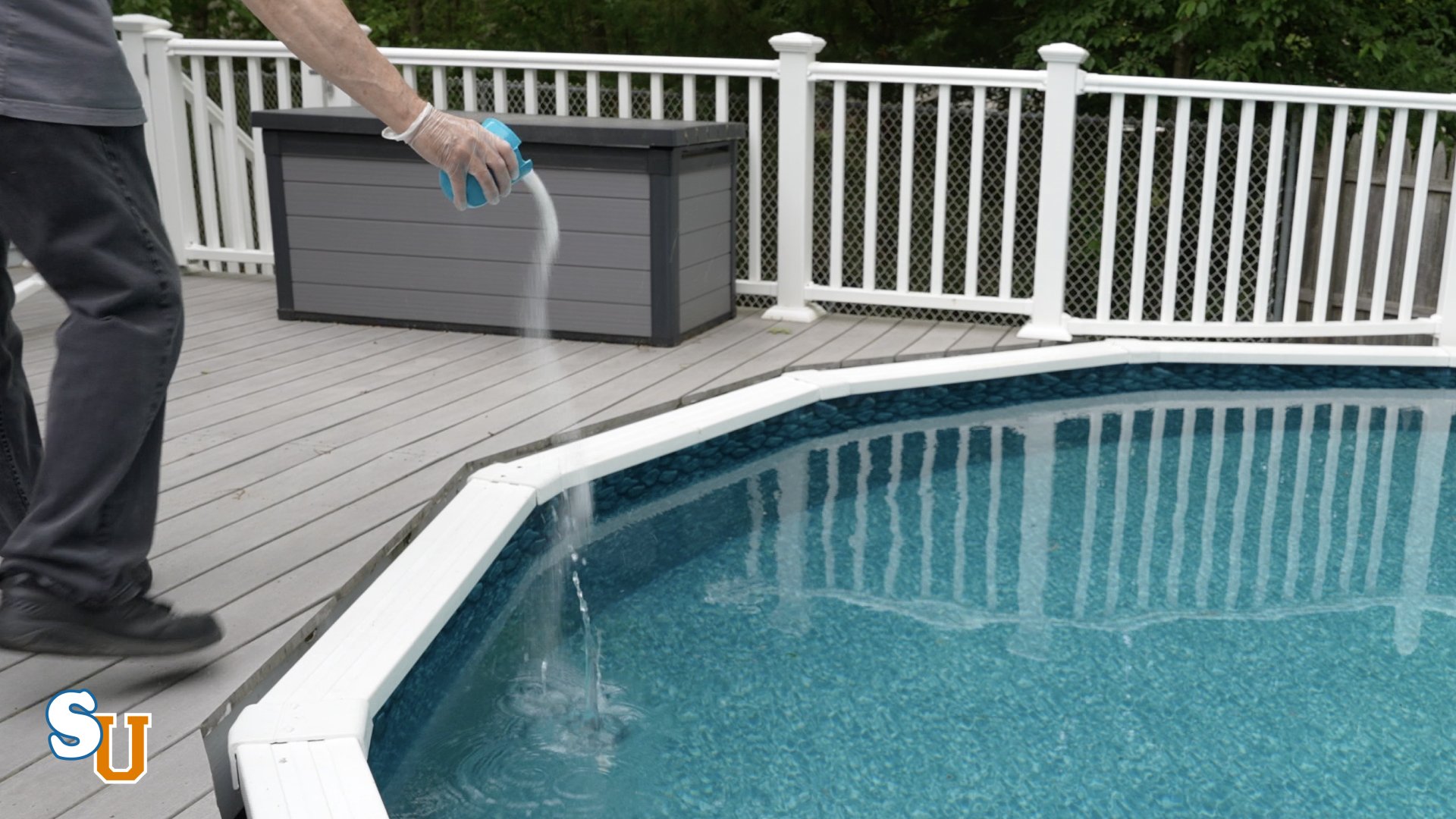Pool Clarifier: How Does It Work and Is It Better Than Pool Flocculant?
If you’re struggling with mild, cloudy pool water and you’re looking for an easy fix, pool clarifier is a great option. It’s a simple method for clearing up cloudiness in your swimming pool. But it won’t work for every cloudy pool problem. So when should you use a clarifier? And when should you use a flocculant instead?
Here’s a quick guide on the difference between clarifier and flocculant and how to use clarifier for crystal clear water. You can watch the quick video below. Or keep reading for the complete pool
Stop wasting time and money with confusing water chemistry and maintenance. Our effortless system guarantees to keep your pool balanced, sanitized, and crystal clear all year. Works for all pools including saltwater.
What is Pool Clarifier?
Pool clarifier clears cloudy water by clumping together the small particles and contaminants. When you add a clarifier to cloudy water, those smaller particles coagulate into bigger particles that can be captured by your filter.
Most clarifiers don’t destroy the particles in your cloudy water. Instead, they bond the tiny particles together into larger clumps. Without a water clarifier, those small particles would simply pass through your pool pump and filter and head right back into your pool water.
Here’s the pool clarifier that we recommend:
Clears cloudy pool water by combining particles, making it easier for your filter to remove. Great for all pools. Also compatible with salt water pools.
What’s the Difference Between Clarifier and Flocculant?
Clarifier coagulates particles into small clumps that are removed by the pool filter. It’s easier to use than flocculant, but it’s not as powerful and generally takes longer to clear up your pool water. Pool flocculant, on the other hand, coagulates particles into larger clumps that sink to the bottom of the pool.
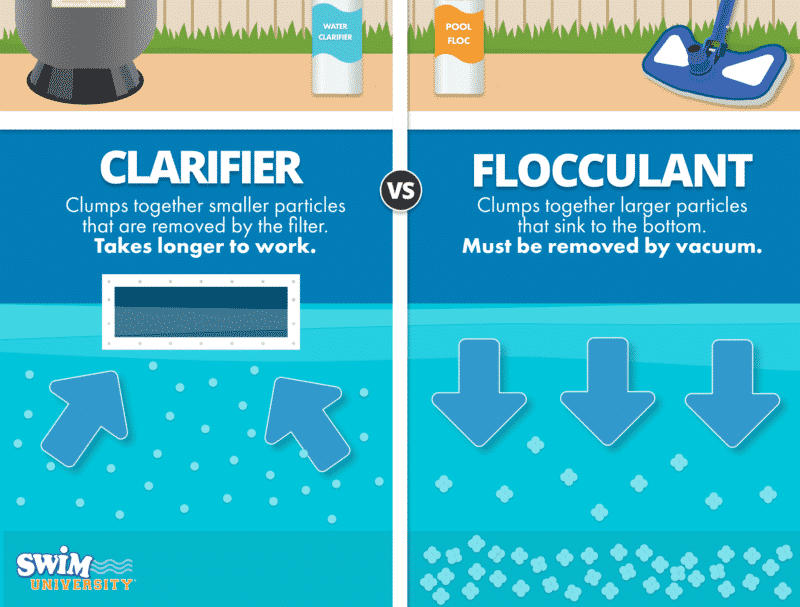
What are the Benefits of Pool Clarifier?
If your pool is only mildly cloudy and you’re not in a rush to clear up your water, pool clarifier is an easy choice for several reasons:
- Pool Clarifier is less work. There’s no need to vacuum out or remove the clarifier once you use it. All you have to do is add the clarifier to the water and wait for it to do its job.
- Pool Clarifier is good for mild cloudiness. If your swimming pool water is just a little cloudy, but you can still see your pool floor, a clarifier is the right choice. And it’s a nice option to use after a pool party.
- Pool Clarifier saves water. Because it uses the natural function of your pool filter, you won’t have to remove any water from the pool when using a clarifier.
- Pool Clarifier can be used anytime. Even when your pool’s not noticeably cloudy, you can add a little clarifier to give the water a little boost and help it look extra sparkly.
What are the Downsides of Pool Clarifier?
Before using a swimming pool clarifier, there are a few instances when it’s not the best option to clear up a cloudy pool:
- Pool Clarifier works slowly. It may be two or three days before your pool is completely clear, depending on the severity of the cloudiness.
- You’ll need to clean the filter using a Pool Clarifier. Once the clarifier has worked, all those clumped particles will be in the filter. You’ll have to backwash your sand filter, clean and backwash your diatomaceous earth or D.E. filter, or clean your cartridge filter medium.
- Pool Clarifier is less powerful. Compared to
pool flocculant , clarifier isn’t as effective at clearing up cloudy pools. It’s better suited for mildly cloudy water.
How Long Does it Take for Pool Clarifier to Work?
Depending on your pool’s level of cloudiness, it can take 2-3 days to clear up your water using pool water clarifier. You’ll need to balance your water and run your filter 24/7 while the clarifier is at work. And if you have an algae problem, you’ll have to address that first before adding clarifier. Be sure to check out our guide on The Smart Way To Kill Algae In Your Pool Quickly.
How To Use Pool Clarifier
Pool clarifier is easy to use, but it’s important to follow the correct steps in the right order to help the clarifier work effectively. Remember: if you also have algae in your pool, address that problem first before using
1. Skim, Brush, and Vacuum Your Pool
You’ll want to make sure the clarifier can work effectively in your water, so start by removing any large debris with a skimmer net. Then brush your walls with a stiff pool brush and vacuum your pool manually.
2. Test and Balance Your Pool Water
Test your water with test strips or a liquid test kit. Then, adjust your pH and alkalinity as needed. Your pH levels should be between 7.4 and 7.6 and your alkalinity levels should be between 100 and 150 ppm.
This complete water testing kit helps keep your pool or hot tub clean and safe to swim in, with easy-to-follow color instructions and all the supplies you need in one box.
3. Shock Your Pool Water
If you have any algae or high levels of combined chlorine (also known as chloramines), you’ll need to shock your water first. Adding a high dose of chlorine, also known as shocking your pool, will help kill any contaminants in your water. If your cloudy water was caused by pool algae bloom, you’ll have to double or triple shock your pool depending on the type of algae.
Run your filter and let the shock dissolve overnight or for at least 8 hours. Then retest your water.
4. Keep Your Filter Running 24/7
Over the next several days, continuously run your filter to help clear up the cloudy water. You can return to your regular filter schedule once your water is cleared up.
Because you’ll be using the power of your filter to clear up the water, your pool will clear faster depending on the type of filter you own. D.E. Filters have the strongest filter capacity and will clear up cloudy water very quickly. Cartridge filters will take a bit longer and sand filters will take the longest.
5. Increase Your Pool Circulation
In order to get all of your pool water through your skimmer and into your filter system, be sure your pool has good water circulation.
You can help churn the cloudy water up from the bottom of the pool to the top by pointing your return jets down at a 45° angle and all in the same direction.
For inground pool owners, make sure your main drain is pulling water from the bottom of the pool into your filter system. If you don’t have a main drain, you can use a manual vacuum cleaner and turn it upside down at the bottom of the pool to act as a main drain.
6. Add Clarifier
After your pool shock has dissipated, it’s time to add pool clarifier. Be sure to read the manufacturer’s instructions and add the correct amount for your size pool. Use a pool calculator if you need help figuring out your pool’s volume. Remember, keep the filter running 24/7 while the
Here’s our recommendation for a pool clarifier:
Clears cloudy pool water by combining particles, making it easier for your filter to remove. Great for all pools. Also compatible with salt water pools.
7. Clean Your Filters and Retest Your Water
After 2 or 3 days your water should be clearer. Clean or backwash your filters and retest your water chemistry. Some pool clarifiers may increase your pH levels, so use a
Use this chemical to lower just the pH level in your pool water.
Should You Use Clarifier or Flocculant?
If your pool is only a little cloudy or you have a cartridge filter, use a pool clarifier. You can use this in any situation with any filter setup. It’s just not as powerful as flocculant and it takes longer to work. If you’ve got extremely cloudy pool water or you want to clear your water fast, use pool flocculant. The flocculant works more effectively at clumping together particles. But you’ll need to manually vacuum out your water while bypassing your filter.
Frequently Asked Questions About Pool Clarifier
Looking for more help using pool clarifier? Here are some common questions and answers.
When should I add Pool Clarifier to my water?
If you have cloudy water but your water chemistry (pH, alkalinity and chlorine) is balanced and your filters are clean, you can add pool clarifier. Pool clarifiers are helpful to use when you’re opening your pool or with mild cloudy water. However, be sure to kill any algae before using pool clarifier (this can usually be done by shocking your pool before using a clarifier).
Most pools can be treated with clarifier up to once a week. Just be sure to keep your pool water chemistry balanced and your pool filter running 24/7 as you’re using the clarifier. However, if you’re constantly experiencing cloudy pool water, you may have other underlying issues like poor filtration or bad water chemistry.
Can I put too much Clarifier in my pool water?
Like many pool chemicals, using too much
Be sure to always follow the manufacturer’s instructions and add the appropriate amount of clarifier based on your pool’s volume. And be sure to keep your water chemistry balanced, including your pH, alkalinity, and chlorine levels. If you need more help with pool chemistry, check out our Basic Pool Chemistry 101 guide.
Can you use Pool Clarifier and Algaecide together?
Before using any
Can you use Clarifier in a Saltwater Pool?
Yes, a
Can you swim in cloudy pool water?
We do not recommend swimming in cloudy pool water. Cloudy pool water is full of debris and contaminants that cause eye irritation. And because visibility is limited, there’s an increased risk of drowning. Avoid swimming in your pool until your water is clear.
What causes cloudy pool water?
Cloudy pool water is caused by poor filtration, low chlorine levels, poor water chemistry, or contaminants in the water, like debris or algae. Pool clarifier can help clear up cloudy water, but it will not solve underlying issues. So be sure your filter system is functioning properly, your pH, alkalinity, calcium hardness and chlorine levels are balanced, and your water is free of algae or debris.
3 Ways We Can Help With Your Pool
- The Pool Care Handbook: An illustrated guide to DIY pool care, including water chemistry, maintenance, troubleshooting, and more.
- The Pool Care Video Course: You’ll get 30+ step-by-step videos and a downloadable guide with everything you need to know about pool maintenance.
- The Pool Care App: Enter your water test results. Get a custom treatment plan. Know exactly what chemicals to add to keep your pool clear.

